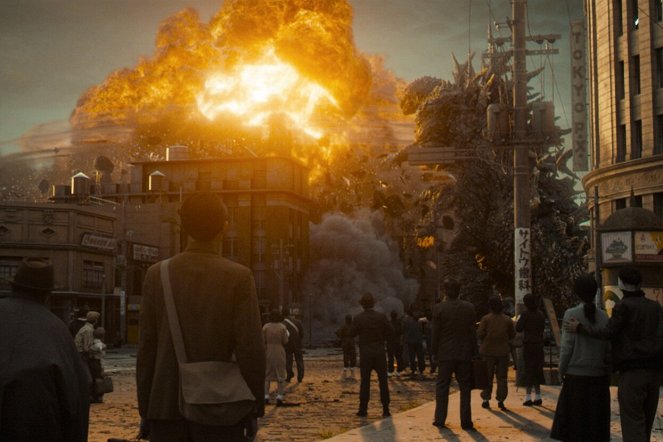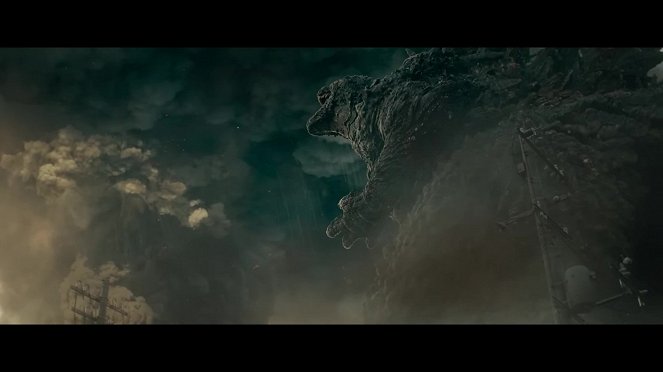Directed by:
Takashi YamazakiScreenplay:
Takashi YamazakiCinematography:
柴崎幸三Composer:
佐藤直紀Cast:
Ryūnosuke Kamiki, Minami Hamabe, 山田裕貴, 青木崇高, Hidetaka Yoshioka, Sakura Andō, Kuranosuke Sasaki, Miō Tanaka, Yûya Endô, 飯田基祐, Sae Nagatani, Tsubaki ŌmuraPlots(1)
Set in a post-war Japan, Godzilla Minus One will once again show us a Godzilla that is a terrifying and overwhelming force, which you already get a sense of from the teaser trailer and poster," Koji Ueda, President of Toho International, said in a statement. "The concept is that Japan, which had already been devastated by the war, faces a new threat with Godzilla, bringing the country into the 'minus.'" (Toho International)
(more)Videos (12)
Reviews (11)
The protagonist’s repetitive lamenting over trauma and remorse becomes boring over time, but the gloomy tone of Japan’s deteriorating position in the war brings a lot to the gigantic monster. Against a background of dark, foreboding music, Godzilla is a symbol of the horrors of war, including the devastating nuclear threat. The ocean scenes with the monster are excellent, with a build-up and ideas to make the most of its physiological capabilities. It is scary, angry and indestructible. The scenes with Godzilla in the city are only perfunctory, as if the filmmakers didn’t want to repeat what has already been seen a hundred times before (even in American monster movies) and instead wanted to retain the specific maritime nature of the story. The budget of $15 million for such high-quality CGI mayhem is unbelievable and the film’s success in American cinemas could signal a change in thinking among the Hollywood bean counters as to what a good movie needs and doesn’t need. In this respect, Godzilla Minus One is another “transformational phenomenon” of the year, much as Barbenheimer was.
()
On the occasion of his almost seventieth birthday, Gojira got a film that goes down well with the majority of the audience. That isn't a bad thing, but if you're expecting a procedural social critique like Shin Godzilla or over the top giant kaiju like in later Japanese works, you'll come away disappointed. A more fitting title would have been "how my post-war life was repeatedly affected by a monster" (the inspiration in the concept from the Godzilla comics: “Half Century War” is evident), because this time around it's stingy on Godzilla, he sort of plays third fiddle. When he does arrive, it's worth it (traditional design, origin and abilities, scale and action), but for most of its running time it's a tear-jerking melodrama about a kamikaze who failed in his duty and suffers from post-traumatic syndrome. He struggles to piece together a life in the ruins of Tokyo and a decimated post-war Japanese society that is also undergoing a fundamental transformation. Only that occasionally they (he and Japan) are shaken by Gojira's claw. Ironically, it's closer to the Pohlywood-ized kaiju variant on Jaws mixed with Pearl Harbor than to the previous Japanese Godzilla films (but the serious ones and the B-movie ones). Another installment is on the cards, but I'd personally prefer a sequel to Shin Godzilla. Perhaps as a satire on the Japanese government's bureaucratic mishandling of covid and the Olympics.
()
This year, it seems to me that perhaps all the films around which there is general hype seem to be slightly above average at best, and Japan's Godzilla -1.0 is another one of those. As long as it deals with the intimate fates of individuals in post-war Japan and the lizard is only seen in waves, it's fine. Once the lizard makes landfall, the Japanese get a chance to use their over-the-top acting, and the characters start hatching crazy plans, but it in the end it turns that the lizard is enough (... well, you'll see), so it goes down the tubes, at least for me. I can appreciate how it looks given its budget, but I can't enjoy it authentically.
()
A return to the roots of a monster that grew out of traumatic guilt, a feeling of failure and the rise of the atomic age, which Japan felt on its body like no other nation. Yamazaki and co. have filmed an organic blend of post-war family drama and Jaws on steroids, making clever and aesthetically economical use of their limited budget. Even though those limits are perceptible, they are always in service of the whole, which is both intimate and epic at the same time. Godzilla Minus One is the kind of blockbuster that Gareth Edwards tried to make, i.e. unencumbered by compromises and pressure from the studio. It is depressing and uplifting, naïve and touching. Everything that I require from a blockbuster!
()
Gojira as a serious war drama? Yes, a return to the classic roots of the first two episodes. It's a terrible shame that most people associate the brand with Hollywood's Monsterverse, or that goofy Emmerich flick with Jean Reno that had nothing to do with Godzilla. They have no idea about the Godzilla phenomenon in the country of its origin, Japan, where TOHO has made a total of 29 feature films starring the overgrown lizard across six decades. Sure, the SHOWA era in the 50s and 60s in particular was very cringe, with Godzilla facing aliens and a monkey and making friends with a little Japanese boy. But this latest installment, essentially an homage, is a return to the rawness of the first two films from 1954 and 1955. Gojira is no pet this time, but a fierce creature happy to bite people in half and throw trains through the air. I was surprised by the screenwriting focus on human characters. Basically the entire first half doesn't leave the setting of the slums on the outskirts of Tokyo, dealing with a sort of small family micro-story, with a momentary detour to the sea, where the mines left behind are being fished out at the cost of their lives, only to have Godzilla start destroying the city after an hour or so, with a familiar musical theme from the TOHO films that brought a smile to my face. There are four action sequences in the film with each one getting better and better. It's unbelievable that this film cost less than Jákl’s Jan Žižka, yet it has the parameters of a big budget film, and by alternating the closed micro environments of one room with lavish CGI scenes, it very cleverly masks its budgetary constraints. Also, fans of the franchise will find references to old standbys, with Gojira's luminous shell playing a major role in this regard. There's also a noticeable sense of the lingering post-war and Hiroshima trauma of the Japanese in the film, just as you'd sense in the old films. It's a great homage, and if it is a reboot, I love it to.
()
Gallery (23)
Photo © 2023 TOHO CO.,LTD.



Ads